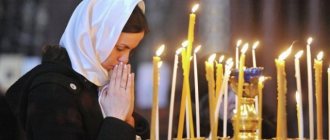The Upper World is a whole host of spirits that help people through life situations. In Orthodoxy, there is the concept of “Jacob’s ladder”, on which spirits (Lords) are located according to the degree of hierarchy. These are spirits who have gone through their entire earthly path, incarnated on Earth many times, and atoned for all their sins, all earthly karma, and became Higher spirits - each at their own level.
These are saints, angels, archangels, and Lords of the planets - people do not know the entire exact structure of the Upper World, but in all religions there are many spirits to whom you can turn with prayers and requests.
— FULL LECTURE WITH CONTENTS. LIST OF ALL LECTURES (VIDEO and TEXT) —
……………………………
…………………………………………………….
How should you read the prayer: out loud, or silently?
Man:
– I have a question for you about prayer. Well, I manage to pray, maybe not two hours, but 30–40 minutes a day. But, I cannot pray by repeating it out loud. I tune in to this holy man, tune in to holiness, disconnect from everything, but prayer still happens in my mind.
Torsunov:
- This is fine. There are two types of prayer. There is a prayer that is created in an image. It is in the mind. This prayer is called contemplation. Contemplation is a very important thing in human life. The mind needs to be cleared. Contemplation is needed. Now, you can switch off and just dive deeply, deeply into holiness with your mind. But there is one problem. Fate is in the mind, you know? In other words, when fate bears down and it “gestures,” then the mind, the whole mind, becomes a stronghold of violence. That is, he does not obey us at all. There is only pain in it, that's all. And then contemplation is impossible. Therefore, there is another tool called the mind. And what kind of instrument is this? Memory lives in both the mind and the mind. But it’s interesting to know that when a person repeats something out loud, he turns on precisely his mind. And the mind is a tool that makes memory change the mind. That is, in other words, the mind is subtler (in structure) than the mind. And he is able to influence the mind. That is, if you say something out loud, then gradually this element of violence that fate creates from your mind goes away. That is, a person feels better because of the sound. Although it is harder to sound than to contemplate. But, in the future, when you may begin to be “mowed down,” when you repeat, your mind is completely in violence. You are mowed down by this violence. But you simply repeat a prayer, and listen to those who are praying, and gradually changes begin to occur in your mind.
You see, in other words, the mind of every person, you, me, is capable of standing aside even at the height of violence. Now, when it’s all already, we are completely in fate, we can’t even sleep or eat, a person is so focused on the pain that fate gives him, it doesn’t matter, even in this state, when he utters a sound associated with God, and when there is still the sound of those who strongly attract my attention, at that moment a person separates from his fate and begins to extinguish the pain. This is how prayer works. This is a very important and valuable thing. But we need to learn this.
Man:
– There is no more pain, I defeated it, it arose through this memory.
Torsunov:
- But, my dears, understand that fate comes and does not ask. And she simply mows down a person. We need to pray out loud. I'll tell you something interesting now. When I first started praying, it was, well, I was about 28 years old. Well, I started to practice it seriously, I prayed in my mind. And I met one man who was praying out loud. And I asked him: “Why are you praying out loud, as it were? What can’t you do in your head?” He said, "I can't." I ask: “Who can?” And he told me the example of one saint, who at first repeated a prayer very loudly for 4-5 hours. Then I prayed in a whisper for about 4-5 hours. And then 5 hours in my mind. I say: “Why did he take so long to prepare in the first place?” He says: “Some even with this preparation do not reach this state.” And I analyzed everything, and realized that I don’t live up to such a saint. So I started repeating it out loud. Do you understand what I'm talking about?
3 hours 15 minutes 20 seconds recording
That is, there is prayer in the mind too. But it’s for very strong people, you know? And if you don’t reach this strength, and fate begins to mow you down, then you’re betting on the wrong thing. You can defeat a tank with a grenade, but to do this you need to be a very experienced warrior. Therefore, it is better to shoot him with a cannon. This is the best option.
— READ END OF LECTURE —
Who to contact during prayer
Therefore, when people pray, it is best to turn to a specific saint, Master, spirit, Supreme teacher, or the Creator himself. That is, appeals must be specific, “nominal”. Why is that? Because if you don’t know who to turn to, the prayer won’t reach you.
After all, prayer is a kind of thought, energy that goes to a specific place, to a specific spirit. Therefore, when people pray, they first of all make an appeal: Muslims turn to Allah; Christians - to Christ; Buddhists - to Buddha or Lord Maitreya.
In general, people are divided into several main religious denominations, beliefs and atheists. In terms of percentage, the picture looks like this:
- Christianity - 33%, among them Orthodox, Catholics, Protestants and other small divisions of Christianity;
- Islam – 23%;
- Hinduism – 15%;
- Buddhism – 7%
- Atheism – 17-20%
The rest belong to a wide variety of beliefs, the listing of which would take a lot of time. These are different branches of the main religions, which in some ways do not agree with them.
Will praying silently, mentally, be considered prayer?
Hello!
This issue is discussed in the Gemara (Berachot 20 b). There is a dispute between the sages: according to Rav Hisda, a prayer read silently to oneself is not considered a prayer, but according to Ravina, it is. The law was established in accordance with the opinion of Rav Hisda, i.e. a prayer recited silently does not count as prayer (Mishna Berurah 62:7, Beur Halacha there). It follows that praying mentally is not enough; it is necessary to pronounce the words. If a person prayed mentally, this does not count and the prayer must be read again. This applies not only to the Amidah prayer, but also to other prayers, such as Shema Yisrael, Birkat HaMazon, blessings on various types of food, etc.
The sages draw conclusions about how to say a prayer and what its form should be, based on the verses that speak of the prayer of Chana, who asked the Creator to send her a son (Shmuel I, 1:13): “And Chana says (= prays) to herself, only her lips move, but her voice is not heard...” The sages consider Hana’s prayer as ideal, and the laws of prayer are derived from this. “Only the lips move...” - from these words they conclude (Berachot 31a) that it is not enough to pray mentally, one should pronounce the words. “...but her (Hana’s) voice is not heard” - from this they conclude that one must pray in a whisper, without raising one’s voice. Moreover, it is believed that a prayer spoken out loud indicates a lack of faith: the person praying seems to show that the Almighty cannot hear a request made in a whisper.
At the same time, initially, the person praying must hear his own voice. This does not contradict the previous rule: you can speak in a whisper and still hear your voice. This helps to concentrate during prayer (Beit Yosef 101:1). However, if a person prayed without hearing his voice, but at the same time pronouncing the words with his lips, the prayer is counted and there is no need to pray again.
Why is it so important to speak the words and not enough to pray silently? We find the answer to this question in the book of Rav Chaim Volozhiner “Nefesh HaChaim”, ch. 5. It says that the main thing in serving the Almighty is physical action. (Therefore, it is not enough to be a “believer in the heart”; our faith must necessarily be manifested in practice. Thoughts and intentions are only a good addition to the physical fulfillment of the commandments, but not its basis). Therefore, when a person prays, his thoughts and requests must be expressed through physical action - the movement of the organs of speech. And in the notes of the Arizal the following is said: the purpose of prayer is the correction of the spiritual worlds, and this can be achieved only by merging the three parts of the human soul: “nefesh”, “ruach” and “neshama”. “Nefesh” is the lowest part of the soul, closest to matter. Its manifestation is physical actions. "Neshama" is the most spiritual of these three parts, its products are thoughts. "Ruach" is the intermediate part. It corresponds to vibrations of sound when pronouncing words. In prayer, we must use all three parts of our soul: through physical action - the movement of the organs of speech, spiritual - concentration and intermediate - the voice. This is how prayer will be most effective and achieve its goal. (From here we can conclude that not only obligatory prayers, but also any personal request to the Creator should not remain only at the mental level, it should be spoken out).
Note: Arizal in his notes operates with Kabbalistic concepts; most of his notes are allusions and metaphors, the true meaning of which cannot be understood by those who are not versed in the secret teaching. The above quotation only gives us an opportunity to touch upon the deep mysteries behind every nuance of the Jewish Law; there is no exhaustive explanation of the words of the Arizal.
Best regards, Moshe Sytin
Is it possible to read your own prayers during services?
Is it possible to read your own prayers during services?
Peace be with you, dear visitors of the Orthodox island “Family and Faith”!
One Orthodox woman asked the following question, which worries many people who do not understand the words of the prayers and chants of the services:
“ in one of the spiritual magazines that it is not allowed in church to read one’s own prayers silently, as well as Orthodox prayers from books separately from church singing, especially at the all-night vigil, when everything is read so quickly and illegibly that one cannot grasp the meaning of the prayers. When I pray during the liturgy, which I know well, I may not use other prayers, but during the all-night vigil it’s a different matter. I should at least read the Jesus Prayer to myself, which my confessor previously allowed me to do: he told me that some saint (forgot his name) said that “if you in church don’t understand the reading, then you need to read the Jesus Prayer.” What now? Does that mean I can’t go to Vespers if I don’t understand the reading? I used to read other prayers, and my attention was not broken.”
Archbishop Averky (Taushev) answers:
“ Public worship is held in the church. This is the common prayer of all believers who are united spiritually in this common prayer about the same thing - about their common spiritual and physical needs. Therefore, the one who, coming to church for the Divine service, does not want to participate in this common prayer, which must be performed “ with one mouth and one heart,”
but prays
on its own, separately
from general church prayer. Only in this sense and only in this is it prohibited in an Orthodox church to pray separately, with your own special prayers, according to prayer books, as is customary, for example, among Roman Catholics who do not participate in general church prayer, like we Orthodox.
BUT FOLLOWING THE SERVICES ACCORDING TO THE SO-CALLED “GREAT COLLECTION” OR OTHER BOOKS OF SERVICE OR PRAYER BOOKS CONTAINING THE SERVICES IS, OF COURSE, NOT AT ALL REJECTIONABLE, BUT, ON THE CONTRARY, IT IS PRAISEABLE, FOR WE SHOULD AT THE TIME SERVICES CAREFULLY FOLLOW WHAT YOU READ AND SING AND PRAY WITH THE SAME WORDS THAT THE WHOLE CHURCH PRAYS.
This is all the more natural when reading and singing are illegible. After all, we, Orthodox believers, must all consciously participate in Divine services, which is clearly indicated by our Charter when it says that in response to the exclamation of the priest “WE” or “PEOPLE” we answer: “AMEN” or “LORD HAVE MERCY” and so on , and singing in church, according to the clear meaning of the statutory instructions, as well as according to the very idea of our Divine service, which is a “common affair,” should, strictly speaking, not be a choir, as something completely separate
from those who pray, and
all who pray.
So, it should be clear that reading your special prayers from prayer books during the Divine Service is one thing,
but following the progress of the Divine service according to the liturgical text is completely
different.
And as much as the first is reprehensible, the second deserves only approval and encouragement.
It is quite acceptable to read the Jesus Prayer while reading and singing indiscriminately, especially since, according to the rules, this prayer can even replace all types of daily Divine services, as indicated in the Following Psalter. Of course, it should be clear that it is better to say the Jesus Prayer to yourself than, without understanding and not understanding what is being read and sung in the choir, allowing your mind to wander to God knows where. A mind that is not occupied with anything naturally indulges in absent-mindedness, and this will undoubtedly be a grave sin.”
Why does a woman have to wear a headscarf when entering church?
Why is it customary to sit in churches, but to stand in Orthodox churches?
<< To the main page Questions for the priest >>









